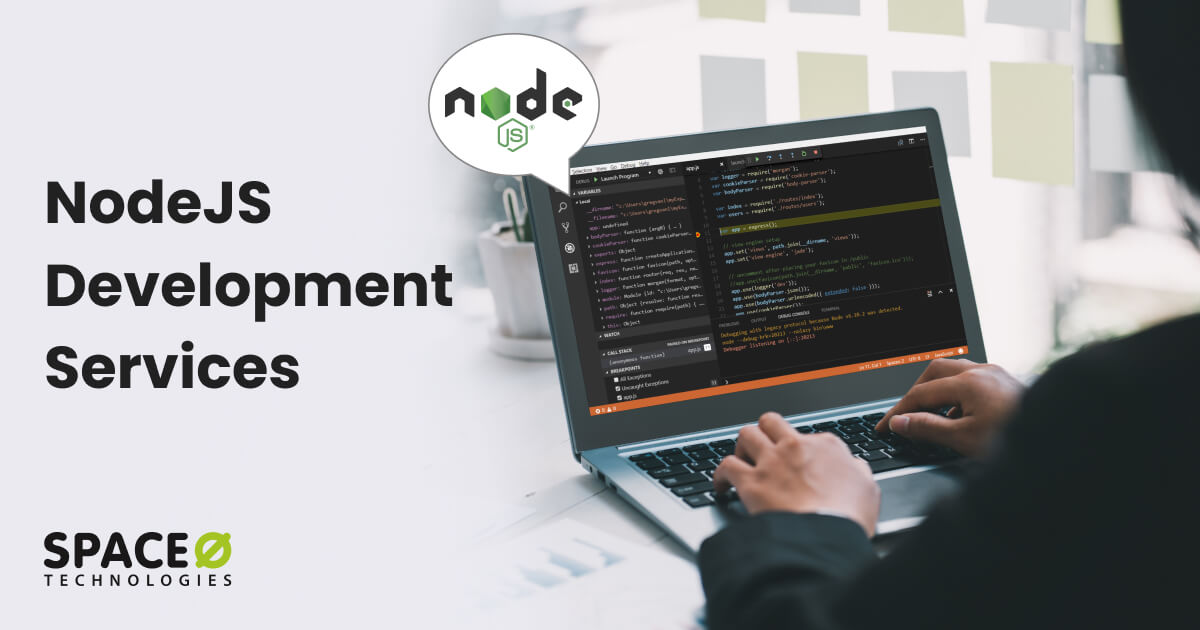Let’s Discuss Your Project
Our Node.js Development Services
Custom Web App Development
We develop scalable Node.js web apps using Express MVC framework, MongoDB, containerization, and REST APIs for high-performance and modular architecture. We implement authentication with Passport.js and build responsive UIs with React frameworks.
API Development and Integration
Our Node.js developers build secure, reliable APIs leveraging GraphQL, OAuth, Kubernetes, automated testing, and API gateways for seamless integration. We enable caching, rate limiting, CORS support, and API versioning for optimal performance.
Microservices Architecture Integration
We deliver independent, containerized Node.js microservices using message brokers like RabbitMQ for coordination, Kubernetes for orchestration, and service mesh for reliability. Our expertise covers domain patterns and database-per-service approaches.
Cloud-native Development
We build resilient, auto-scalable Node.js apps using serverless runtimes like AWS Lambda, implementing CI/CD pipelines, monitoring, and observability best practices. Our cloud experts assist with cloud cost optimization and cross-cloud migration capabilities.
IoT Solution Development
Our Node.js engineers develop IoT applications leveraging speed and non-blocking I/O for interfacing sensors, ingesting data streams via Kafka, and building digital twins with NoSQL databases. We assist with IoT device provisioning and data visualization needs.
Migration and Modernization
Our specialized migration services involve planning, incremental refactoring, benchmarking, testing, and optimizing your Node.js transition for modernization. Our team provides ongoing maintenance and Node.js upgrade support capabilities beyond launch.
Our Node.js Web Development Engagement Models
Our Node.js web development engagement models at Space-O Technologies are designed to meet diverse project requirements and client preferences. As a seasoned Node.js development company, we offer flexible, tailor-made solutions to ensure the success of your web applications
![]()
Project-based Development
Get a complete Node.js solution developed under a fixed-bid project model.
Pricing
Min. Project Price $10,000+
Billing method
Fixed bid
Duration
Project-based
Billing cycle
Milestone payments
Benefits
Predictable project budget with no hidden costs
Custom solutions tailored to your specific business needs
Dedicated Node.js development team for your project
![]()
Dedicated Node.js Team Model
Have a dedicated in-house style Node.js team work exclusively on your project throughout its lifecycle.
Pricing
Minimum Project Price: $3,000+/month
Billing method
Monthly retainer
Duration
Long-term
Billing cycle
Monthly
Benefits
Extended team capacity with skilled resources
Specialized domain and technology expertise
Ongoing post-launch support
![]()
Time and Material Model
Scale developer capacity up or down using a time and materials model. Pay only for the expert time you use.
Pricing
Starts at $30/hour
Billing method
Time and Materials
Duration
On-demand
Billing cycle
Hourly rate
Benefits
Flexible scaling of team size
No long-term contract commitment
Pay only for the number of hours worked
Ready to Harness the Agility and Speed of Node.js?
Tired of rigid off-the-shelf products that don’t fit your needs? Take the custom development route and experience the flexibility and capabilities of tailored Node.js apps. Leverage our full lifecycle of custom Node.js web development services:
Collaborative Planning Sessions
Solution Scoping & Architecture
Agile Node.js Build Process
Rigorous Testing & Security
Controlled Launch & Rollout
Responsive Maintenance & Support
Client Love Space-O Technologies
Best Node.js Development Partner
Space-O, renowned for Node.js expertise, is your go-to for critical Node.js projects. Our teams excel in full-stack development, adeptly handling integration and architectural complexities.
What truly differentiates us is our expertise in leveraging Node.js to enhance and expand your existing systems and applications. We specialize in integrating Node.js with legacy systems, cloud platforms, APIs, microservices, and more to boost capabilities and performance.
- Providing optimal, high-scalability solutions meeting every project requirement
- Getting more value from existing systems by plugging in Node.js
- Building resilient, failure-isolated Node.js systems designed for reliability
- Expanding features without adding complexity by prioritizing Node.js
If you are seeking a strategic Node.js solution development partner, Space-O is your right choice. Book your 30-minute free consultation to know how we will be helpful to you for your Node.js project.
Let’s Discuss Your Node.js Project
Top Node.js Solutions Developed By Us
Explore the range of top-tier Node.js solutions developed by us at Space-O Technologies, a premier Node.js development company, showcasing our commitment to innovation and excellence.
Our Node.js Solutions Recognized & Featured In
Build Scalable Node.js Backend Today
Our experienced team design and build backends custom to your needs leveraging proven tech like Express, NestJS, TypeScript, and MongoDB. Accelerate your digital initiatives with a secure, transformative Node.js system custom-fit for your business objectives. Let’s connect to explore possibilities.
Technology Stack We Use for Node.js Development
Leverage a diverse range of technologies for dynamic and efficient Node.js applications:
Programming Languages and Frameworks
To build efficient and scalable applications, we use:
- Node.js: For event-driven, ideal for scalable network applications.
- TypeScript: For strong typing for enhanced code stability.
- JavaScript (ES6/ES7): For modern syntax for dynamic scripting.
- CoffeeScript: Offers a more concise syntax for JavaScript coding.
- Express.js: For minimalistic, perfect for fast, scalable apps.
- NestJS: For enterprise-level server-side applications.
- Koa: Provides enhanced expressive middleware development.
- Sails.js: Emphasizes convention over configuration for rapid development.
Database Technologies
Implementing robust data management solutions:
- MongoDB: Flexible NoSQL database for diverse data handling.
- PostgreSQL: Offers features for complex data operations.
- MySQL: Reliable and widely used for structured data storage.
- Cassandra: High performance under heavy loads, suitable for large datasets.
Front-End Integration
Seamlessly integrating with front-end technologies:
- React: For building interactive and modern UIs.
- Vue.js: For developing a progressive framework with intuitive user interfaces.
- Angular: For developing powerful dynamic web applications.
- Ember.js: Enables rapid development of ambitious web apps.
DevOps & Deployment Tools
Enhancing deployment and operational efficiency:
- Docker: Streamlines application deployment across environments.
- Kubernetes: Manages and scales containerized applications.
- Jenkins: Automates aspects of software development.
- Ansible: Simplifies and automates cloud provisioning, configuration, and management.
Testing Frameworks
Ensuring application integrity and performance:
- Jest: Delivers a smooth unit testing experience.
- Mocha & Chai: Offers Versatile testing for backend applications.
- Cypress: Provides end-to-end testing for modern web apps.
- Sinon.js: Standalone test spies, stubs, and mocks for JavaScript.
Cloud Services
Optimizing for scalability and performance in the cloud:
- AWS: Comprehensive cloud services for diverse needs.
- Azure: Integrated cloud solutions for modern applications.
- Google Cloud: Scalable and reliable cloud computing services.
- Heroku: Cloud platform as a service for effortless scaling and deployment.
Best Node.js Combinations for Full-stack Development
Here are 3 recommended full-stack combinations with Node.js on the backend and popular frontend frameworks:
React + Node.js + Express.js + MongoDB
React manages the frontend UI, Node.js + Express.js handles the server and API logic, and MongoDB provides the flexible NoSQL data store.
Vue.js + Node.js + AdonisJS + MySQL
Vue.js drives the responsive frontend experience, paired with AdonisJS (MVC Node.js framework) on the backend and MySQL for relational data reliability.
Angular + NestJS + PostgreSQL
For enterprise-grade apps, Angular provides extensive frontend capabilities combined with NestJS backend framework leveraging Node.js async strengths and PostgreSQL database.
Node.js Use Cases
Here are some of the top use cases and applications for ReactJS:
Real-time Web Applications
Node.js excels in building applications that require real-time updates and interactions, such as chat applications and live collaboration tools.
Data-Intensive Apps
It’s perfect for data-rich applications like live tickers and tracking dashboards, necessitating real-time data handling.
Scalable Data Visualization
Node.js smoothly integrates with data visualization libraries, enabling interactive charts and graphs for extensive datasets.
Complex Forms
Node.js simplifies server-side processing of intricate forms, vital for insurance claims, payment processing, and registration forms.
Progressive Web Apps (PWAs)
Node.js powers PWAs, enabling offline support, push notifications, and responsive design for advanced web apps.
Internet of Things (IoT) Applications
Node.js is well-suited for managing IoT devices, handling sensor data, and facilitating real-time monitoring in IoT ecosystems.
Why Choose Node.js for Web App Development?
Asynchronous, Non-blocking I/O
Enables efficient handling of concurrent requests without blocking the server, making it ideal for scalable, high-performance applications.
JavaScript for Both Client and Server
Streamlines development by using the same language on both the client and server sides, facilitating easier and faster development.
Robust Ecosystem
Offers a vast range of modules and packages through the Node Package Manager (NPM), simplifying the addition of new features and reducing development time.
Strong Community Support
Benefits from a large and active community, providing abundant resources, tools, and libraries, as well as support for resolving issues.
Real-time Data Processing
Excellently suited for real-time applications (like chat apps and gaming) due to its event-driven nature and WebSocket support.
High Performance
Engineered on Chrome’s V8 JavaScript engine, Node.js delivers high performance and speed in code execution, enhancing overall application efficiency.
Our Node.js Web App Development Lifecycle
At Space-O, we adhere to best practices in our Node.js web application projects, ensuring efficient development and successful results. Our development lifecycle comprises:
01
Discovery Phase
Our sales team understands your requirements, and if needed, sends an NDA. Our technical team then takes over for highly technical projects, assessing feasibility, and providing precise estimations. This includes creating a comprehensive Work Breakdown Structure (WBS) with the collaboration of a pre-sales business analyst, detailing the tech stack, features, terms and conditions, and resource allocation.
02
Planning and Designing
We share the WBS and other essential documents with the project team. This phase begins with a kick-off meeting, where the business analysis team discusses project features and expectations, gathers feedback, and creates a detailed SRS and Wireframe using Miro and Figma. These tools help us visualize and plan the project effectively, aligning with the WBS, deliverables, and estimations.
03
Project Set Up
While the client reviews the initial design, our technical team sets up the necessary infrastructure, including a local server on Gitlab and a staging server on AWS. Concurrently, our QA team established a project on Mentis for bug tracking and Jenkins for build management. The project manager creates a project in Basecamp, organizes team members’ hours, and creates a detailed project plan with phases and delivery dates.
04
Start Designing
The designing phase involves our Graphics Designer creating three design variants based on information from the kick-off meeting, WBS, Mind-map, and Wireframes. These designs are then sent to you for approval. After your approval, backend development begins based on the chosen design, marking a crucial step in the project’s progression.
05
Development and QA
In our agile development process, we divide your project into multiple phases to incorporate client feedback at each stage, ensuring alignment with their vision. Developers closely refer to the WBS, Mind-map, and Wireframes throughout this development process. Meanwhile, Quality Assurance teams work in tandem, with approving details. This collaborative approach ensures quality and adherence to project requirements.
06
Publishing on Live Server
In the final phase, our technical team takes charge of publishing the website/application on the live server, transitioning from our local server. Updates and progress are regularly shared on Basecamp or directly with the client updating them about the project’s status and marking its completion.
Our Industrial Domain Expertise
Leveraging Node.js, we deliver high-performance, scalable web solutions across diverse industries, tailored to meet specific business needs and user expectations.
eCommerce
We utilize Node.js to create responsive and efficient eCommerce platforms. This includes optimizing back-end performance for handling high traffic and streamlining transaction processes, enhancing overall online shopping experiences.
Finance
In finance, we build secure and dynamic applications with Node.js, focusing on real-time data processing for stock tickers, investment platforms, and banking applications, ensuring fast and secure financial transactions.
Media
For media platforms, we employ Node.js to improve streaming services, social media networks, and content-driven websites. Our emphasis is on high-performance, scalable solutions for smooth user interactions and efficient content delivery.
Travel
In the travel sector, we use Node.js to develop user-friendly platforms providing real-time updates and intuitive interfaces, aimed at improving the experience of travelers and adventure enthusiasts.
Healthcare
We leverage Node.js in healthcare to create medical apps, hospital websites, and insurance portals. Our focus is on reliable, accessible user experiences, ensuring high performance and security in healthcare applications.
Real Estate
We apply Node.js to build responsive real estate platforms, focusing on real-time property listings, smooth user experiences, and efficient data management, catering to both realtors and property seekers.
Frequently Asked Questions
How much does it cost to develop a Node.js project?
The cost to develop a Node.js solution depends on the factors like the type of solution you want to develop and the features to be integrated. For a simple Node.js project like a basic web app, costs typically range from $5,000 to $15,000. Medium complexity projects like a web app with a database backend usually cost $15,000 to $30,000. More advanced platforms with features like user logins and permissions can cost between $30,000 to $60,000+. Timelines vary based on scope.
How long does it take to build a Node.js solution?
A simple 3-5 page Node.js web app can be built in 2-4 weeks. A medium-sized web app with 5-10 pages and basic database integration usually takes 4-8 weeks. Complex platforms with advanced functionality can take 6+ months with ongoing enhancements.
How will I monitor the progress of my Node.js web development project?
We use Jira, Basecamp, and Trello for project management and task tracking. This provides complete transparency into development status through features like story point tracking, task assignment, release planning, etc. Additionally, we schedule weekly demos to show the new features added and take feedback for the same. Source code, documents, and UI designs are also maintained in Gitlab repositories allowing you real-time visibility through commit history, annotations, and content update tracking.
How do you perform source code management?
Our Node.js skilled developers manage source code files for all projects in self-hosted Gitlab repositories. Granular user access permissions are set up so that only authorized team members have read/write rights as per roles. Code commits are required to follow our standardized naming conventions for easier traceability and identification. Regular code reviews along with multiple approval checks from peers and the quality analysis team are instituted before merges to the master branch. This ensures the highest code quality and security against unauthorized modifications.
How will you protect my intellectual property rights after I outsource the Node project to you?
Safeguarding our clients’ Intellectual Property is of utmost importance to us. Our standard onboarding process covers getting Non-Disclosure Agreements and IP rights transfer documents signed. We follow best practices around code encryption, restricted developer access as well as code reviews, analysis, and testing to protect IP while delivering secure code. Based on your specific project and business needs, IP ownership rights can be retained solely by your company or jointly shared and transferred across both parties.
What level of security will my Node.js project have?
Our developers are trained to ensure end-to-end security by implementing measures like encryption, OAuth-based access controls, parameterized input validation, hashing for storage, etc. specific to the identified threats. We additionally invest in external penetration and security testing phases before launch to identify and promptly address gaps well in time. Based on the application and data sensitivity, security controls are chosen appropriately to provide robust, all-round protection.
What if I am not satisfied with the developers’ work and would like to exit?
If you are unsatisfied at any point, we will review the causes and see if issues can be resolved with a new team. If you still wish to exit, we will hand over all documentation, code, and credentials to you and transition smoothly. Any payments will be made only for the work completed.
Can I hire Node.js developers from you and manage them directly?
We offer dedicated Node.js developers for direct hiring under our extended team model. After initial technology onboarding, they operate as your remote team while you take over management. You can lead daily standups, plan sprints, assign tasks, and set delivery expectations per business priorities. We also facilitate screening calls and technical interviews for you to assess your capabilities before making the hiring decision. This ensures you find the best fit technical resource.
Will your Node.js developers be available to have a meeting in my time zone?
We maintain a diverse talent pool hailing from various time zones like EST, PST, IST, CET, etc. When staffing project teams, we ensure mapping resources to your timezone so that overlap for meetings and calls is maximized. Developers are easily accessible for daily interactions during times feasible to you. We also confirm availability beforehand when planning longer review meetings or design discussions.
Is it possible to use your Node.js development services for minor changes?
Post launching your Node.js web or mobile applications, there may arise a need for minor enhancements or maintenance fixes. Our developers are available for such ongoing support by being on retainer contracts ranging from 10 hours/week to full-time. This on-demand model is optimal for adding new features, integrations, styling revamps, bug fixes, or optimization efforts after the main development delivery. So whether minor tweaks or new functionality, our resident Node.js experts can implement those changes reliably.








